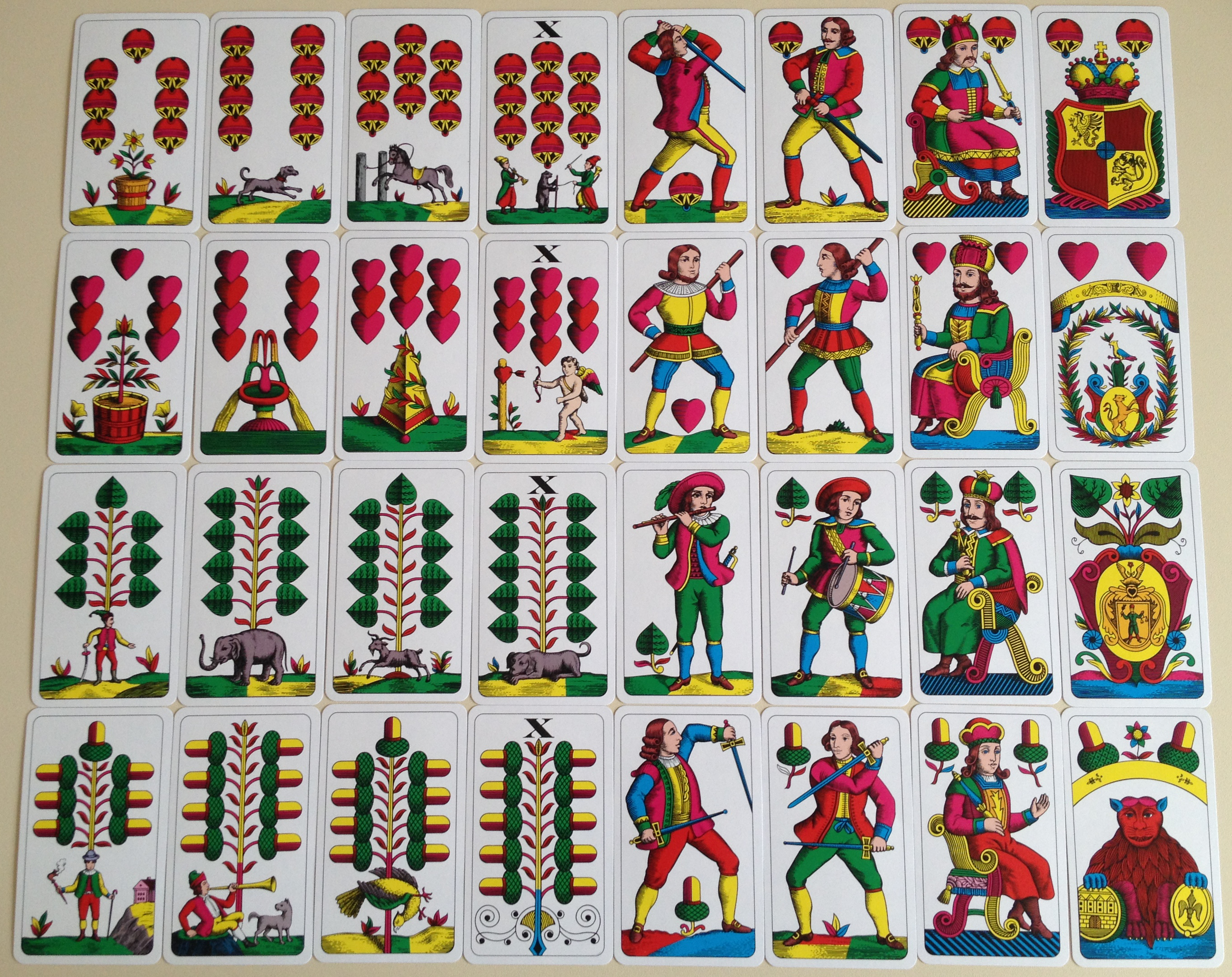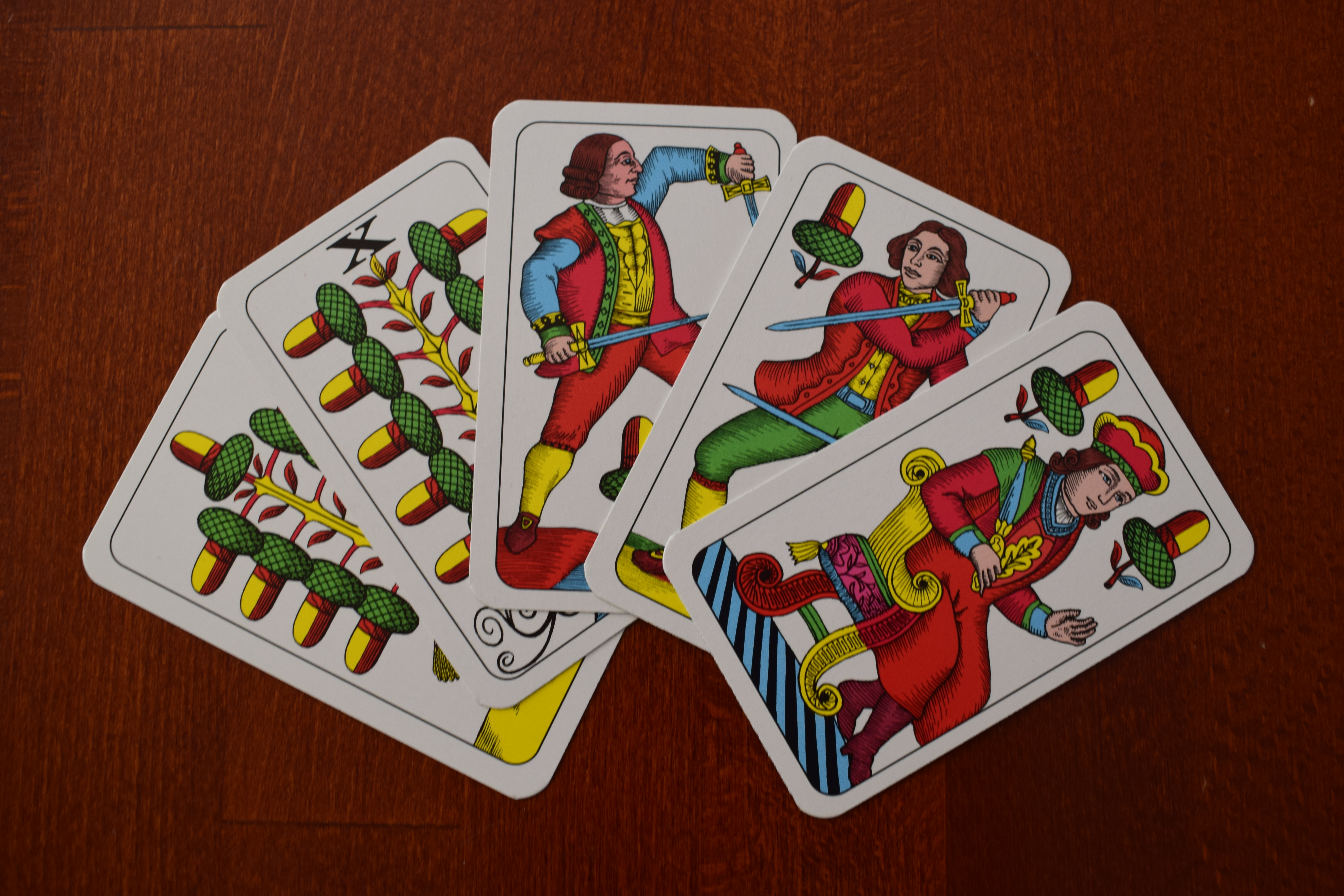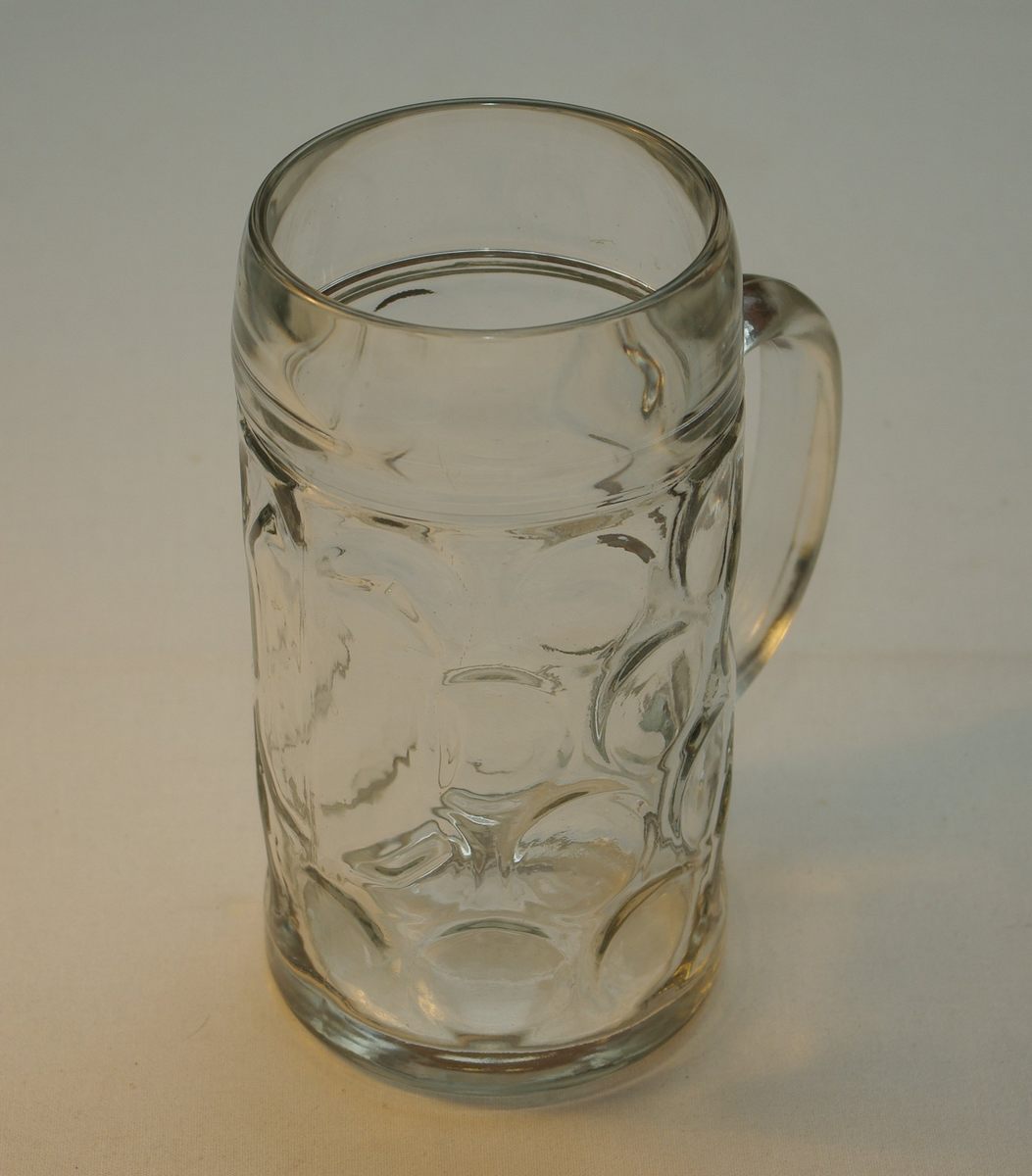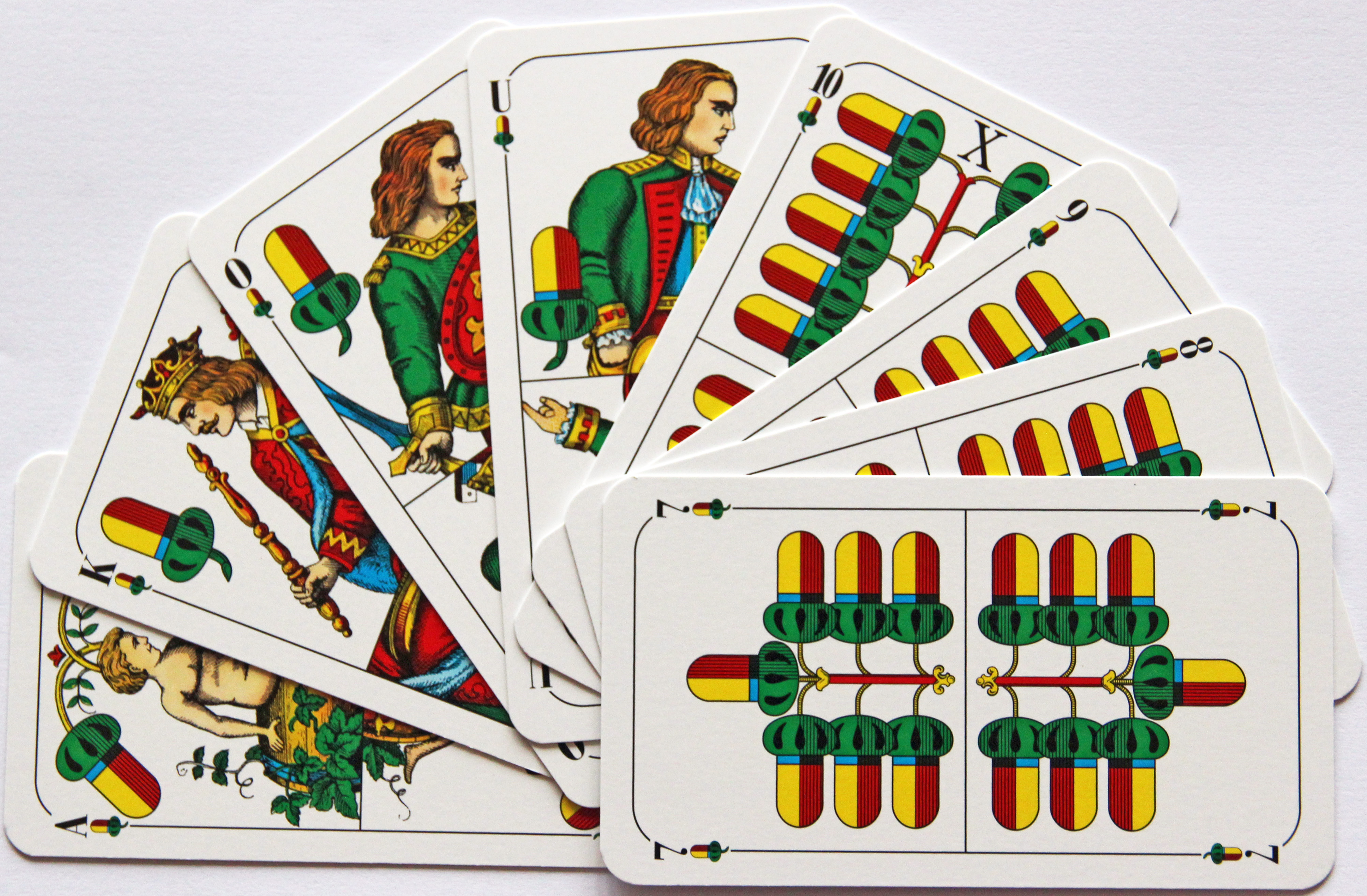|
Lusti-Kartl'n
Lusti-Kartl'n or Lusti-Kartn is a Bavarian trick-taking, card game for four players with an unusual rule for winning the tricks. Like the Czech game of Sedma, the winner of a trick is the last one to play a card of the same rank as the led card. Players form two teams of two and thus are able to smear their partner's tricks or play blanks if they think their opponents will win the trick. The only counters are the Aces and Tens, worth 10 points each, and there are 10 more points for the last trick. The aim is thus to win 50 or more points. Background Lusti-Kartl'n is a point-trick game for 4 players in which the aim is to score 50 or more card points from a total of 90. Players form permanent teams of two, the partners sitting opposite one another. There are no trumps. Cards Lusti-Kartl'n is played with 32 cards from a Bavarian pattern pack; the Sixes are left out. The Aces and Tens are worth 10 points each; the remaining cards are non-counters. As taking the last trick e ... [...More Info...] [...Related Items...] OR: [Wikipedia] [Google] [Baidu] |
Sedma Group
Sedma is a Czech 4-card trick-and-draw game played by four players in fixed partnerships with a 32-card Bohemian-pattern pack. Card suits do not play a role in this game, and there is no ranking order. A trick is won by the last player to play a card of the same rank as the card led. The card game gives its name to the 'Sedma group' which includes closely related games such as the Finnish Ristikontra, the Yugoslavian Sedmice, the Romanian Șeptică, the Hungarian Zsírozás (also Zsíros or Zsír), the Bavarian Lusti-Kartl'n, the German Schmierer and the possibly Polish Hola. These games have been described as highly unusual members of the Ace-Ten family, found only in Central and Eastern Europe.. Cards Normally a 32-card, German-suited, Bohemian-pattern pack is used; these are obtainable online. However, as in other games played with this pack it can be replaced by other German-suited cards, a French-suited Piquet pack comprising 32 cards from Ace to Seven in each suit. In e ... [...More Info...] [...Related Items...] OR: [Wikipedia] [Google] [Baidu] |
Hola (card Game)
Sedma is a Czech 4-card trick-and-draw game played by four players in fixed partnerships with a 32-card Bohemian-pattern pack. Card suits do not play a role in this game, and there is no ranking order. A trick is won by the last player to play a card of the same rank as the card led. The card game gives its name to the 'Sedma group' which includes closely related games such as the Finnish Ristikontra, the Yugoslavian Sedmice, the Romanian Șeptică, the Hungarian Zsírozás (also Zsíros or Zsír), the Bavarian Lusti-Kartl'n, the German Schmierer and the possibly Polish Hola. These games have been described as highly unusual members of the Ace-Ten family, found only in Central and Eastern Europe.. Cards Normally a 32-card, German-suited, Bohemian-pattern pack is used; these are obtainable online. However, as in other games played with this pack it can be replaced by other German-suited cards, a French-suited Piquet pack comprising 32 cards from Ace to Seven in each s ... [...More Info...] [...Related Items...] OR: [Wikipedia] [Google] [Baidu] |
Sedma
Sedma is a Czech 4-card trick-and-draw game played by four players in fixed partnerships with a 32-card Bohemian-pattern pack. Card suits do not play a role in this game, and there is no ranking order. A trick is won by the last player to play a card of the same rank as the card led. The card game gives its name to the 'Sedma group' which includes closely related games such as the Finnish Ristikontra, the Yugoslavian Sedmice, the Romanian Șeptică, the Hungarian Zsírozás (also Zsíros or Zsír), the Bavarian Lusti-Kartl'n, the German Schmierer and the possibly Polish Hola. These games have been described as highly unusual members of the Ace-Ten family, found only in Central and Eastern Europe.. Cards Normally a 32-card, German-suited, Bohemian-pattern pack is used; these are obtainable online. However, as in other games played with this pack it can be replaced by other German-suited cards, a French-suited Piquet pack comprising 32 cards from Ace to Seven in each suit. In e ... [...More Info...] [...Related Items...] OR: [Wikipedia] [Google] [Baidu] |
Șeptică
Sedma is a Czech 4-card trick-and-draw game played by four players in fixed partnerships with a 32-card Bohemian-pattern pack. Card suits do not play a role in this game, and there is no ranking order. A trick is won by the last player to play a card of the same rank as the card led. The card game gives its name to the 'Sedma group' which includes closely related games such as the Finnish Ristikontra, the Yugoslavian Sedmice, the Romanian Șeptică, the Hungarian Zsírozás (also Zsíros or Zsír), the Bavarian Lusti-Kartl'n, the German Schmierer and the possibly Polish Hola. These games have been described as highly unusual members of the Ace-Ten family, found only in Central and Eastern Europe.. Cards Normally a 32-card, German-suited, Bohemian-pattern pack is used; these are obtainable online. However, as in other games played with this pack it can be replaced by other German-suited cards, a French-suited Piquet pack comprising 32 cards from Ace to Seven in each s ... [...More Info...] [...Related Items...] OR: [Wikipedia] [Google] [Baidu] |
Sedmice
Sedmice ("Seven") is a card game of the Sedma family played in the states of the former Yugoslavia. Like other games of this family, tricks are won by matching the led card in rank. In addition, the Sevens are wild, hence the name. In Croatia, the game is called Šuster. Overview Two players can participate, but the optimal number is four players (in two pairs). The game is played clockwise. Each player is initially dealt 4 cards. Cards Sedmica is played with 32 cards. If German suited cards are used the pack comprises: *4 x Sevens (''sedmica'') *4 x Eights (''osmica'') *4 x Nines (''devetica'') *4 x Tens (''desetica'') *4 x Unters (''dolnjak'') *4 x Obers (''gornjak'') *4 x Kings (''kralj'') *4 x Aces (''as'') Suits The cards typically have the following suits: Rules The basic motto of the game is: "A card takes a card, the Seven takes everything." The following rules are based on McLeod: [...More Info...] [...Related Items...] OR: [Wikipedia] [Google] [Baidu] |
Bavarian Pattern Pack
German-suited playing cards are a very common style of traditional playing card used in many parts of Central Europe characterised by 32- or 36-card packs with the suits of Acorns (''Eichel'' or ''Kreuz''), Leaves (''Grün'', ''Blatt'', ''Laub'', ''Pik'' or ''Gras''), Hearts (''Herz'' or ''Rot'') and Bells (''Schelle'', ''Schell'' or ''Bolle''). The German suit system is one of the oldest, becoming standard around 1450 and, a few decades later, influencing the design of the now international French suit system of Clubs, Spades, Hearts and Diamonds. Today German-suited playing cards are common in south and east Germany, Austria, German-speaking Switzerland, Liechtenstein, north Italy, Hungary, Czech Republic, Slovakia, Slovenia, Croatia, Bosnia, northern Serbia (Vojvodina province) and central and western Romania. History Playing cards (''Spielkarten'') originally entered German-speaking lands around the late 1370s. The earliest cards were probably Latin-suited like those ... [...More Info...] [...Related Items...] OR: [Wikipedia] [Google] [Baidu] |
German Deck Card Games
German(s) may refer to: * Germany (of or related to) **Germania (historical use) * Germans, citizens of Germany, people of German ancestry, or native speakers of the German language ** For citizens of Germany, see also German nationality law **Germanic peoples (Roman times) * German language **any of the Germanic languages * German cuisine, traditional foods of Germany People * German (given name) * German (surname) * Germán, a Spanish name Places * German (parish), Isle of Man * German, Albania, or Gërmej * German, Bulgaria * German, Iran * German, North Macedonia * German, New York, U.S. * Agios Germanos, Greece Other uses * German (mythology), a South Slavic mythological being * Germans (band), a Canadian rock band * "German" (song), a 2019 song by No Money Enterprise * ''The German'', a 2008 short film * "The Germans", an episode of ''Fawlty Towers'' * ''The German'', a nickname for Congolese rebel André Kisase Ngandu See also * Germanic (other) * Germa ... [...More Info...] [...Related Items...] OR: [Wikipedia] [Google] [Baidu] |
Bavarian Card Games
Bavarian is the adjective form of the German state of Bavaria, and refers to people of ancestry from Bavaria. Bavarian may also refer to: * Bavarii, a Germanic tribe * Bavarians Bavarians ( Bavarian: ''Boarn'', Standard German: ''Baiern'') are an ethnographic group of Germans of the Bavaria region, a state within Germany. The group's dialect or speech is known as the Bavarian language, native to Altbayern ("Old Bava ..., a nation and ethnographic group of Germans * Bavarian, Iran, a village in Fars Province * Bavarian language, a West Germanic language See also * * Bavaria (other) {{disambiguation Language and nationality disambiguation pages ... [...More Info...] [...Related Items...] OR: [Wikipedia] [Google] [Baidu] |
Maß
' (pronounced ) or ' ( Swiss spelling, elsewhere used for dialectal ) is the German word describing the amount of beer in a regulation mug, in modern times exactly . The same word is also often used as an abbreviation for ', the handled drinking vessel containing it, ubiquitous in Bavarian beer gardens and beer halls, and a staple of Oktoberfest. This vessel is often referred to as a beer mug by English speakers, and can be correctly called a beer stein only if it is made of stoneware and capable of holding a regulation ''Maß'' of beer. Linguistics The word "''Maß''" can be of either neuter or female grammatical gender. In its neuter form, ''das Maß'', it is the German word for "measure". Its feminine version, "''die Maß''", is used in southern Germany and Austria to refer to a one-litre glass beer mug or its contents. It is spelled "''Maß''" or "''Mass''" (both spellings are permissible) in Germany and Austria, and "''Mass''" in Switzerland. The plural is also '. A ston ... [...More Info...] [...Related Items...] OR: [Wikipedia] [Google] [Baidu] |
Hard Score
The following is a glossary of terms used in card games. Besides the terms listed here, there are thousands of common and uncommon slang terms. Terms in this glossary should not be game-specific (e.g. specific to Bridge (card game), Bridge, Hearts (card game), Hearts, Poker (card game), Poker or Rummy), but apply to a wide range of card games. For glossaries that relate primarily to one game or family of similar games, see #Game-specific glossaries, Game-specific glossaries. A ; Ace # The card with one pip in a pack of cards. Usually the highest card of a #suit, suit, #rank, ranking immediately above the #King, King. May also occupy the lowest rank. # Commonly refers to the #deuce, Deuce or Two in #German-suited pack, German-suited packs which don't have real Aces. Often the highest card of a suit. ; Acorns (card suit), Acorns : One of the four #suit, suits in a #German pack, German-suited pack of cards. Symbol: ; active # A card that is in play i.e. not #sleeping, sle ... [...More Info...] [...Related Items...] OR: [Wikipedia] [Google] [Baidu] |
Soft Score
The following is a glossary of terms used in card games. Besides the terms listed here, there are thousands of common and uncommon slang terms. Terms in this glossary should not be game-specific (e.g. specific to Bridge, Hearts, Poker or Rummy), but apply to a wide range of card games. For glossaries that relate primarily to one game or family of similar games, see Game-specific glossaries. A ; Ace # The card with one pip in a pack of cards. Usually the highest card of a suit, ranking immediately above the King. May also occupy the lowest rank. # Commonly refers to the Deuce or Two in German-suited packs which don't have real Aces. Often the highest card of a suit. ; Acorns : One of the four suits in a German-suited pack of cards. Symbol: ; active # A card that is in play i.e. not sleeping. # See active player. ; active player # A player who receives cards in the current deal (i.e. is not sitting out because there are more players than the game is designed for a ... [...More Info...] [...Related Items...] OR: [Wikipedia] [Google] [Baidu] |





